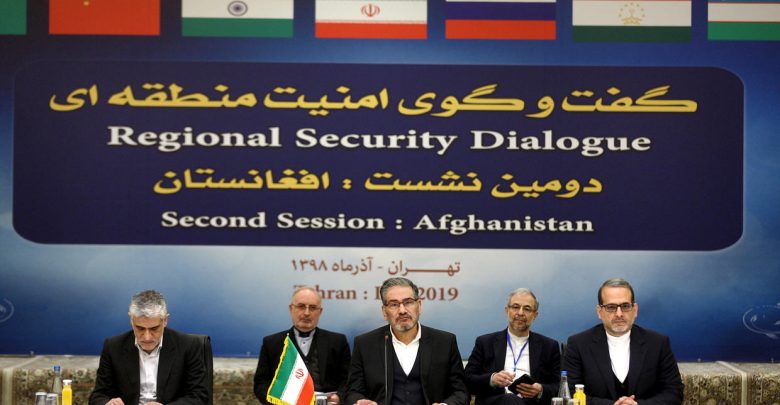Iran opposes US-Taliban talks, rejects ridiculous claim of sending arms to militant group
Iran’s top security official has rejected US claims that it is providing weapons to the Taliban in order to fight the US influence in Afghanistan.

“Wherever Iran has offered military assistance, it has not denied it. Iran has rendered advisory assistance to Iraq, Syria and Yemen. Iran need not provide weapons in Afghanistan. Any weapons … can be provided in abundance,” Secretary of Iran’s Supreme National Security Council Ali Shamkhani said while speaking at a presser at the end of the second edition of the Regional Security Dialogue in Tehran on Wednesday.
“Such an allegation does not concur with Iran’s policy to help the government and peace and stability in Afghanistan,” he added.
Shamkhani’s remarks came as a Pentagon report claimed last month that Iran was providing weapons, money and training to the Taliban in order to fight the US influence in Afghanistan.
Iran supports intra-Afghan not US-Taliban talks
Elsewhere in his remarks, Shamkhani said that Iran opposed the US-Taliban talks, noting that “any strategy, any decision without the participation of the Afghan government is wrong and doomed to failure.”
Shamkhani noted that Tehran did not trust the US-led negotiations due to having once cooperated with Washington on Afghanistan but having been “put in the Axis of Evil” despite Tehran’s “praiseworthy, positive and benevolent measures.”
“We stressed during today’s meeting that the Afghan people and government should serve as the basis for any decision [on the country] and solutions should lead to problems and … insecurity,” he said.
He threw Iran’s weight behind intra-Afghan talks, saying any talks between Tehran and the Taliban served no purpose but facilitate the Afghan-Afghan talks.
In his remarks, the senior Iranian official pointed to the presence of Daesh in Afghanistan, saying the terror outfit was relocated to the Southeast Asian country to create insecurity on the borders of China, Russia and Iran.

US relocating Daesh to Afghanistan to justify military presence in region: Leader Ayatollah Khamenei says the US is seeking to legitimize its presence in the region by moving the terrorists from Iraq and Syria to Afghanistan.
He also called for cooperation among regional countries to fight what he describes as the United States’ ill-wishes in the Middle East, saying the US and its Western allies have failed to bring peace and security to Afghanistan.
Shamkhani stressed that Iran plays a key role in maintaining security in the region.
Washington began conducting on-again-off-again talks with the Taliban excluding the Afghan government last year.
The US resumed talks with the Taliban in Qatar on December 7, three months after President Donald Trump abruptly scuttled an agreement signed in early September, citing ongoing Taliban violence, including a Kabul bombing that killed an American soldier.
The talks were paused after another Taliban attack, at Bagram air base north of the Afghan capital.

Iran, Russia warn about Daesh relocation from Mideast to AfghanistanSecurity chiefs of Iran and Russia warn about the deliberate transfer of Daesh terrorists from their former Middle East bastions to Afghanistan.
Meeting with a visiting Taliban delegation last month, Foreign Minister Javad Zarif voiced Iran’s readiness to help promote intra-Afghan talks aimed at restoring peace and stability to the neighboring war-wracked country.
The meeting took place on November 26 in Tehran between Zarif and the delegation led by Mullah Abdul Ghani Baradar, the head of Taliban’s Qatar-based political bureau.
The US first invaded Afghanistan in 2001 under the banner of fighting “terrorism.” The invasion toppled the Taliban, but the group has never stopped its attacks, citing the foreign military presence as one of the main reasons behind its continued militancy.







